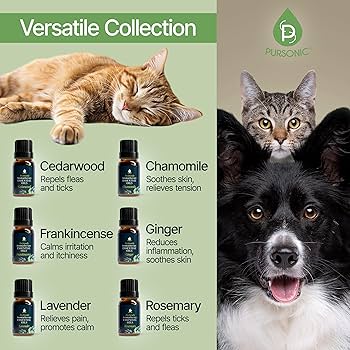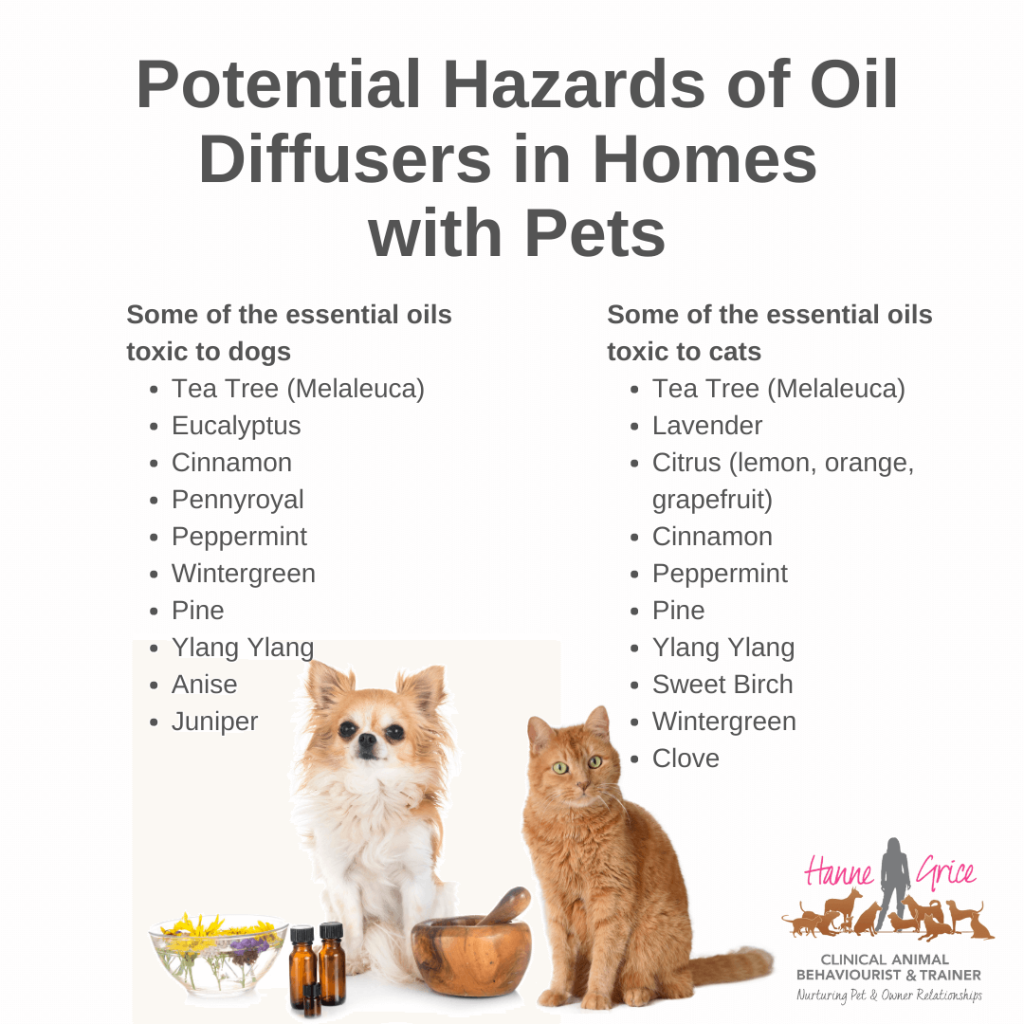Do you love using essential oils to create a soothing atmosphere in your home? While these oils can transform your space into a sanctuary of calm, they might not be as friendly to your feline friend.
If you own a cat, it’s crucial to know which essential oils could be harmful to your beloved pet. Imagine unwittingly exposing your cat to something dangerous; it’s a nightmare every pet owner wants to avoid. This article uncovers the essential oils that could pose a threat to your cat’s health.
You’ll learn how to keep your furry companion safe while still enjoying the benefits of aromatherapy. Dive in, because understanding these risks could be the key to ensuring your cat’s well-being.

Credit: www.amazon.com
Common Toxic Essential Oils
Cats can be harmed by certain essential oils. Tea tree, peppermint, and eucalyptus oils are especially dangerous. These oils can cause serious health issues in cats if they are ingested or even inhaled.
Essential oils have gained popularity for their natural healing properties, but not all are safe for our feline friends. Cats are particularly sensitive to certain oils, which can lead to serious health issues. Understanding which oils pose a risk is crucial to keeping your pet safe. Here’s a closer look at some of the most common toxic essential oils for cats.Tea Tree Oil
Tea tree oil is often praised for its antibacterial and antifungal properties. However, it can be highly toxic to cats, even in small amounts. A friend of mine once used tea tree oil on her cat’s bedding, hoping to freshen it up. Her cat developed tremors and lethargy, a stark reminder of how dangerous this oil can be for cats. Symptoms of tea tree oil poisoning in cats include drooling, vomiting, and difficulty walking. If you suspect your cat has been exposed, immediate veterinary care is essential.Peppermint Oil
The refreshing scent of peppermint oil is a favorite for many people, especially in diffusers. But for cats, peppermint oil is a potential hazard. I once read a story about a cat owner who diffused peppermint oil to help with her headaches. Her cat soon started sneezing and coughing, indicating respiratory distress. Cats exposed to peppermint oil may experience breathing difficulties or skin irritation. Always ensure your home is well-ventilated if you use this oil, and keep your cat in a separate area.Citrus Oils
Citrus oils, such as lemon and orange, smell delightful to humans but are toxic to cats. I recall a time when I used lemon oil in my cleaning routine. My curious cat licked a few drops off the floor and soon became nauseous and disoriented. These oils can cause gastrointestinal upset and central nervous system depression in cats. It’s wise to avoid using citrus oils in areas where your cat spends time. Are you surprised by how common these oils are in everyday products? It’s vital to read labels and stay informed to protect your furry friend.
Credit: www.cbc.ca
Symptoms Of Essential Oil Poisoning
Lavender and tea tree oils can be dangerous for cats, causing vomiting and drooling. Watch for breathing difficulties and weakness. Immediate vet care is crucial to prevent further harm.
Are you aware that some essential oils can be harmful to your feline friend? Recognizing the symptoms of essential oil poisoning in cats is crucial. Cats are sensitive creatures, and even a small amount of exposure can lead to serious health issues. Understanding these symptoms can help you act quickly, ensuring your cat’s safety and well-being.Behavioral Changes
You may notice your cat acting unusually restless or agitated. They might start pacing around the house or become excessively vocal. If your typically calm cat suddenly seems disoriented or uncoordinated, it’s a sign something might be wrong.Physical Signs
Be on the lookout for physical symptoms like drooling or vomiting. Your cat might also develop a rash or redness on their skin, especially if they came into direct contact with the oil. A sudden loss of appetite or lethargy can also be red flags.Respiratory Distress
Essential oils can affect your cat’s breathing. Signs of respiratory distress include wheezing, coughing, or difficulty breathing. If your cat is panting or breathing rapidly, it’s essential to seek veterinary care immediately. Have you ever noticed any of these signs in your cat after using essential oils at home? It’s important to remember that not all oils are safe for pets. Always research and consult with a veterinarian before introducing new scents into your environment. Your feline friend’s health depends on it.Factors Increasing Risk
Essential oils can pose risks to cats. These risks depend on several factors. Understanding these can help keep your feline friend safe. Let’s explore these factors in detail.
Concentration Levels
The concentration of an essential oil affects its toxicity. High concentrations can be harmful. Cats are more sensitive to concentrated oils. Diluted oils are generally safer. Always check the concentration before use.
Exposure Duration
How long a cat is exposed to essential oils matters. Short exposures are less risky. Long exposures increase the chance of harm. Continuous exposure can lead to severe health issues. Limit the time your cat is exposed.
Sensitivity Variations
Cats have different sensitivity levels. Some cats are more sensitive than others. This means a safe oil for one cat may harm another. Always monitor your cat’s reaction to new oils. Consult a vet if unsure.
Safe Practices For Cat Owners
Many cat owners enjoy the calming effects of essential oils. But not all oils are safe for our feline friends. Cats have a unique metabolism that struggles to process certain compounds. This can lead to serious health issues. Safe practices are crucial to keep your pet healthy.
Proper Storage
Store essential oils out of reach. Cats are curious and may knock bottles over. Keep them in high cabinets or locked drawers. Dark glass bottles preserve oil quality. Label each bottle clearly to avoid confusion.
Dilution Techniques
Never use undiluted essential oils on cats. Dilute oils with a carrier oil like coconut or olive oil. This reduces the oil’s potency and minimizes risks. Always test a small amount first. Watch for adverse reactions.
Alternative Solutions
Consider using pet-friendly alternatives. Some oils like lavender can be safe in small amounts. Consult a veterinarian before trying new oils. Choose products specifically designed for pets. They are often safer and more suitable.
Emergency Actions To Take
Lavender, tea tree, and eucalyptus oils pose risks to feline health. Cats lack the enzymes to break down essential oils, leading to toxicity. Keep these oils out of reach to ensure your pet’s safety.
Essential oils have become a staple in many homes, praised for their myriad benefits. Yet, they can pose significant risks to our feline friends. If your cat has been exposed to dangerous essential oils, quick action is crucial. But what should you do in the heat of the moment? Knowing the right emergency steps can be the difference between a minor scare and a serious health issue.Immediate Steps
If you suspect your cat has come into contact with an essential oil, act swiftly. First, remove your cat from the area to prevent further exposure. Check for signs of distress such as drooling, vomiting, or difficulty breathing. These are indicators that your cat may be in trouble. Avoid trying home remedies or inducing vomiting, as they might worsen the situation. Instead, focus on getting professional help.Veterinary Intervention
Contact your vet immediately. Share what type of oil your cat was exposed to and the symptoms observed. This information helps in providing timely treatment. Transport your cat to the vet as quickly as possible. Every minute counts in minimizing potential damage. Once at the vet, stay informed about the treatment plan. Understanding the process can help you make informed decisions about your cat’s care.Preventive Measures
To prevent future incidents, store essential oils securely. Cats are curious creatures and can easily knock over bottles. Educate yourself on which oils are harmful. Common ones include tea tree, eucalyptus, and lavender. Awareness is your first line of defense. Consider alternatives to essential oils for home fragrance or cleaning. Many products are pet-friendly and won’t pose a risk to your beloved cat. Reflecting on the urgency of these actions, have you ever found yourself in a similar situation? How did you manage it? Sharing experiences can be enlightening and a powerful tool for learning.Myths About Essential Oils And Cats
Some essential oils pose risks to cats, causing health problems. Tea tree and eucalyptus oils can be toxic. Citrus oils are also dangerous and should be avoided. Using these oils around cats can lead to severe reactions. Understanding which oils are harmful helps keep your feline friends safe.
Myths About Essential Oils and Cats Many cat owners are drawn to the calming and therapeutic properties of essential oils. Yet, misinformation can lead to unintentional harm. Let’s clear up some common myths about essential oils and cats to keep your feline friends safe.Natural Equals Safe
A common misconception is that if something is natural, it must be safe. This isn’t always true, especially for cats. While you might enjoy the soothing scent of lavender or eucalyptus, these oils can be toxic to your furry companion. I once thought using natural cleaners with essential oils would be better for my cat’s environment. Little did I know, my choice could have led to serious health issues for my pet. Have you ever assumed something natural was harmless, only to learn otherwise?All Oils Are Toxic
On the flip side, not all essential oils are inherently toxic to cats. It’s crucial to differentiate between harmful and non-harmful oils. For example, chamomile oil is generally considered safe in very small amounts, while tea tree oil is extremely toxic. If you’ve been avoiding all essential oils in fear of harming your cat, you might be missing out on safe options. The key is research and understanding which oils pose a threat. Would you like to explore safe alternatives for your home? Understanding these myths can help you make informed decisions about using essential oils around your cats. Always consult with a vet if you’re unsure about an oil’s safety. Your cat’s health should always come first.:strip_icc()/dangers-of-essential-oils-555089-v4-5ae1f28904d1cf003cd0fb16-78b6840719d44148a4dea9a5bebe7d6f.jpg)
Credit: www.thesprucepets.com
Frequently Asked Questions
What Essential Oils Are Poisonous To Cats?
Cats can be poisoned by essential oils like tea tree, eucalyptus, peppermint, and citrus. Avoid lavender, cinnamon, and wintergreen oils. Keep oils away from cats to prevent harm.
Can You Diffuse Essential Oils Around A Cat?
Diffusing essential oils around cats can be harmful. Some oils are toxic and can cause respiratory issues. Always consult a vet before using essential oils near your cat. Ensure proper ventilation and avoid direct contact with your pet. Prioritize your cat’s safety to prevent any health risks.
Which Oils Are Not Good For Cats?
Essential oils like tea tree, eucalyptus, peppermint, and citrus are harmful to cats. These oils can cause skin irritation, respiratory issues, and toxicity. Always consult a veterinarian before using oils around cats to ensure their safety and well-being.
What Happens If My Cat Smells Peppermint Oil?
Cats might experience irritation or discomfort from peppermint oil. It can cause drooling, vomiting, or difficulty breathing. Keep peppermint oil out of reach to ensure your cat’s safety. If symptoms persist, consult a veterinarian promptly.
Conclusion
Protecting your cat from harmful essential oils is crucial. Some oils, like tea tree and peppermint, can be toxic. Always check labels and consult your vet before using oils. Ensure your home is safe for your feline friend. Avoid using oils around cats unless you know they are safe.
Keep oils stored securely, out of reach. Watch for signs of distress or illness in your cat. Regular vet check-ups can help catch any issues early. Be mindful and cautious, ensuring a healthy environment for your pet. Your awareness keeps your cat safe and happy.
